By: Brandon Raquio
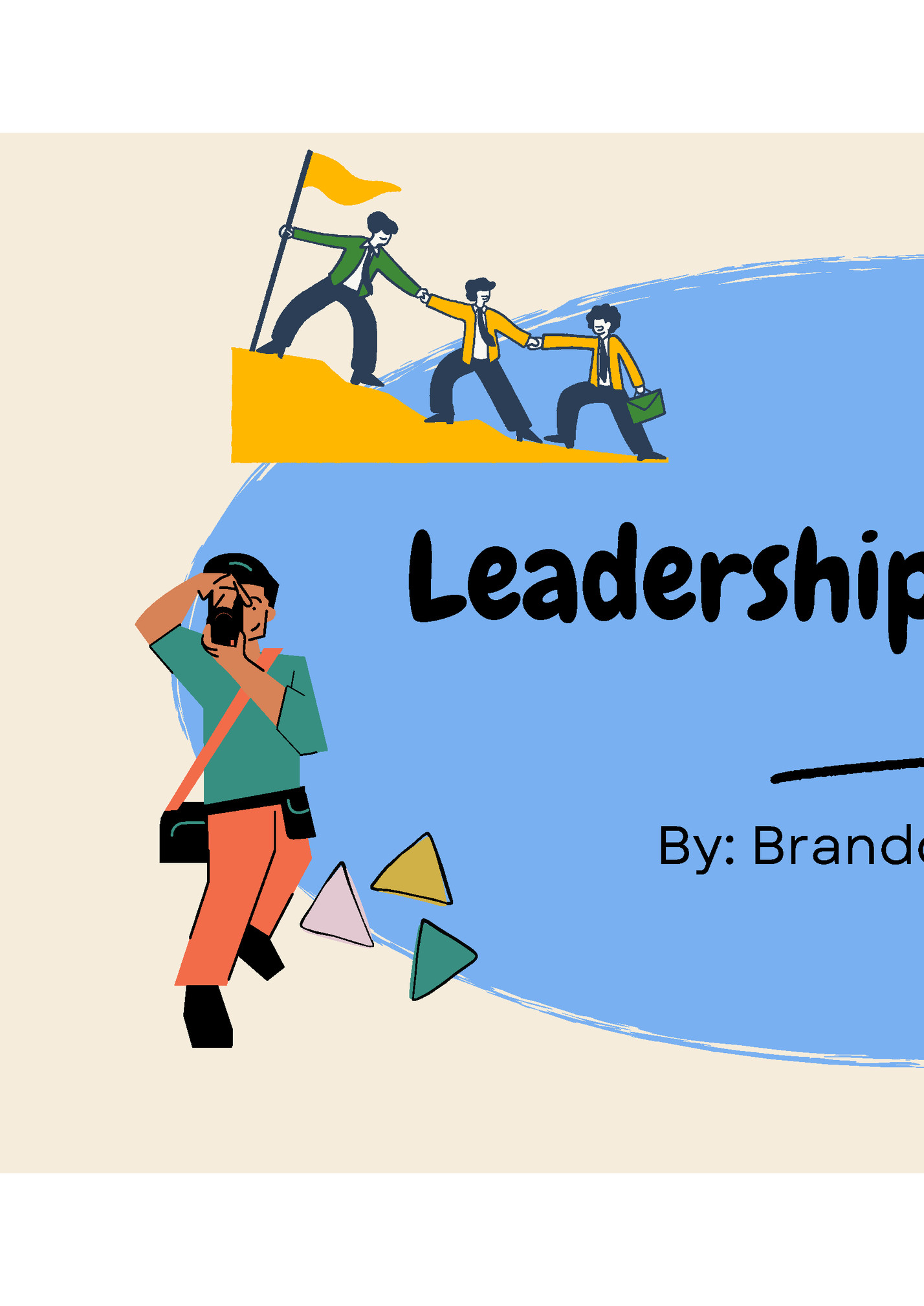
3.Purpose and Values Mission Statement Leadership Philosophy Core Values and Leadership Practices 4. Personal Balanced Scorecard Four Key Areas: Financial, Stakeholders, Internal Processes, and Learning & Growth Metrics and Reflections 5. Emotional Intelligence Assessment Strengths and Areas for Improvement Action Plan to Improve EQ 6. Coachee Reflection Experience and Lessons Learned Key Takeaways 7. Leadership Challenge 1: Leading My Compensation Group Project Actions Taken and Lessons Learned 8. Leadership Challenge 2: Leading the Returns Section at a Warehouse Actions Taken and Lessons Learned Leadership Development Plan 9.Priority Areas: Balanced Scorecard, Emotional Intelligence, Coachee Reflection, Leadership Challenges Goals and Action Steps 10. Closing Page Contact Information: LinkedIn, Email
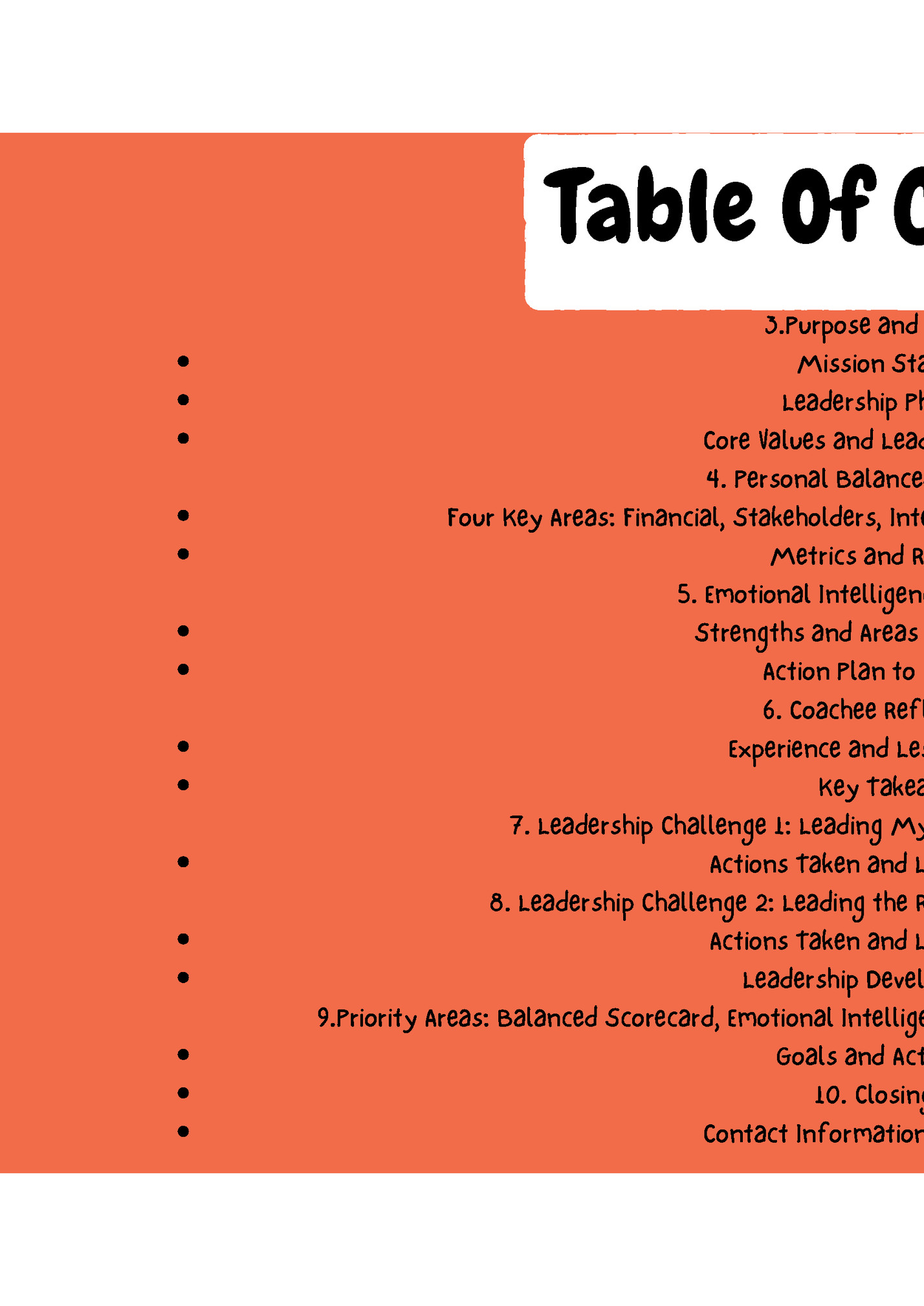
Values As a leader, my mission is to create inclusive, collaborative, and growth-oriented environments where people feel valued and supported. By leveraging empathy, adaptability, and integrity, I aim to inspire individuals to reach their full potential while fostering innovation and equity. I strive to leave a lasting impact by promoting teamwork, continuous learning, and meaningful connections. Coaching and Development Supporting Other Empathy ProblemSolving Adaptability Growth LEADERSHIP PHILOSOPHY Collaboration Integrity Conflict Resolution Supporting Other
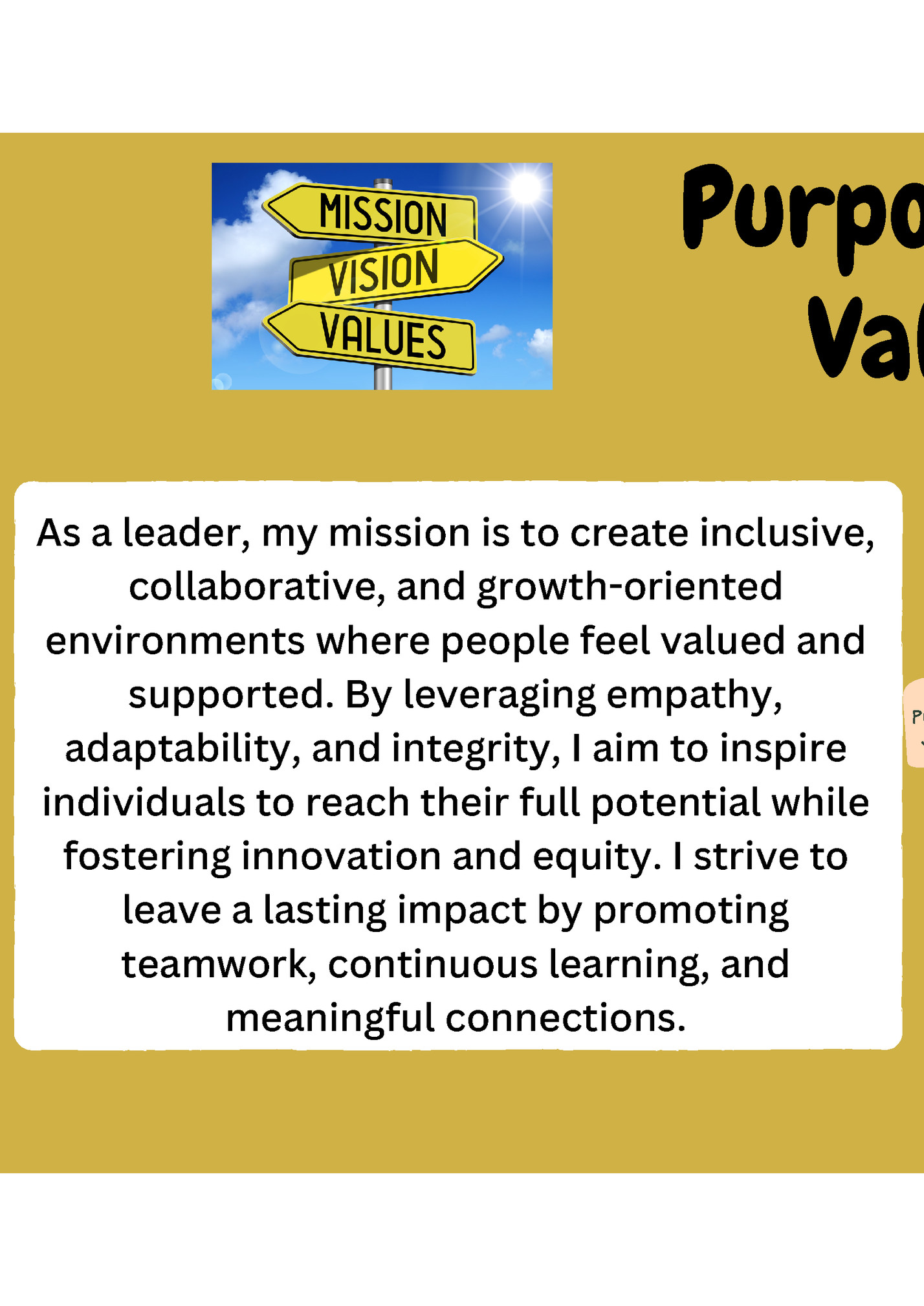
The personal balanced scorecard helps me track my growth as a student and leader in four key areas. The financial perspective ensures that I manage my budget wisely, focusing on tools and workshops that contribute to my development. The stakeholder perspective helps me evaluate how well I collaborate with others, emphasizing teamwork and constructive feedback. The internal processes perspective focuses on improving my leadership abilities, such as decision-making, conflict resolution, and time management. Lastly, the learning and growth perspective encourages me to keep improving through workshops, reading leadership materials, and reflecting on my progress. These metrics give me a clear understanding of my development and help me become a more effective leader.
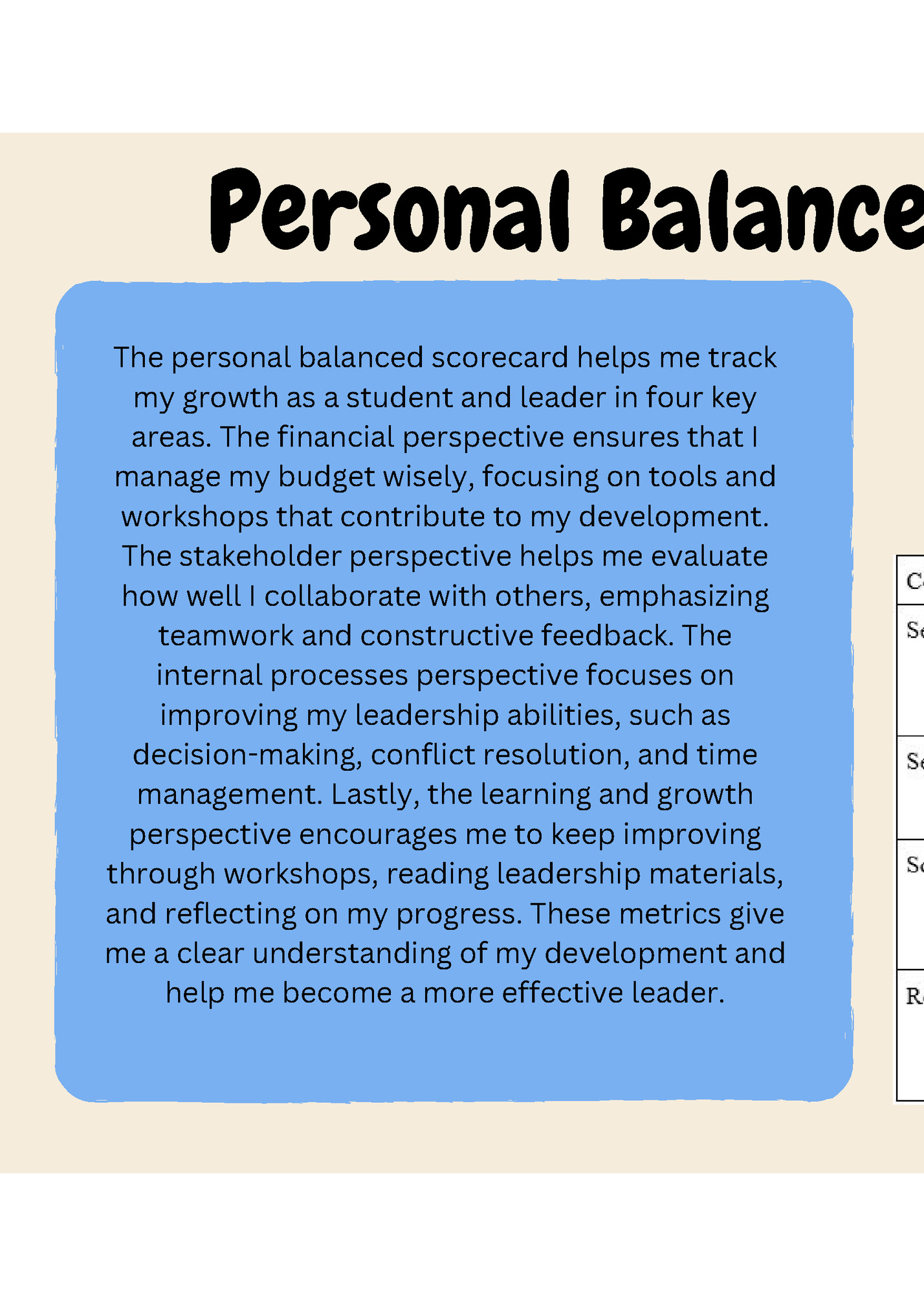
Developing emotional intelligence is critical for anyone pursuing a leadership role, especially in HR, where effective interpersonal interactions are essential. By journaling my emotions and practicing empathy, I aim to improve my self-awareness and social awareness. I will focus on strengthening my self-management and relationship management through mindfulness and engaging in challenging conversations. Participating in workshops will provide additional tools and perspectives to ensure I continuously improve. This plan will prepare me to handle workplace interactions with empathy, confidence, and professionalism, enhancing my effectiveness as a future leader.
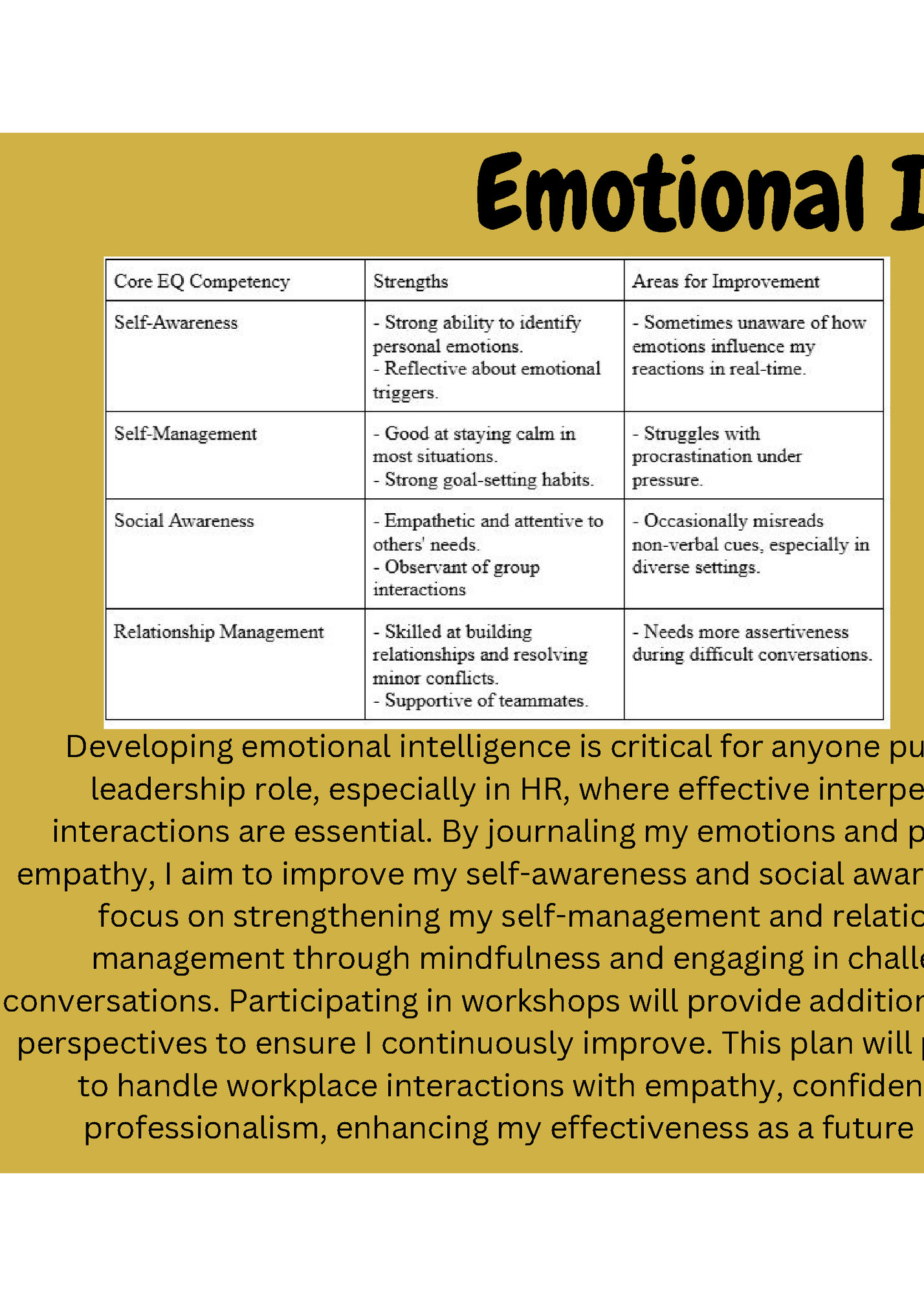
It was educating to be the coachee during the coaching sessions, and it required me to think about my leadership and emotional intelligence. I was somewhat hesitant to talk about my emotional struggles at first, but my coach's thoughtful, open-ended questions helped to create a secure and encouraging environment. This provided me with the opportunity to look into my habits and thought processes in greater detail, especially about self-awareness and empathy, and to observe how they impact my social interactions and choices. One of my main takeaways was realizing how important it is to keep track of my emotions. While I will admit that my behaviour wasn't always consistent, journaling assisted me in recognizing patterns and emotional triggers. Another significant realization was the importance of peer feedback. I was motivated and encouraged to know that my attempts to actively listen and demonstrate empathy were being understood when I requested input. But what truly caught my attention was how splitting large objectives into smaller, more achievable steps makes them seem less daunting. For example, to practice staying calm and understanding, my coach recommended that we start by role-playing difficult conversations. I felt relaxed taking on difficult situations after hearing that one suggestion. I want to apply what I've learned going forward. To maintain consistency, I'm pointing out that I should write down ideas daily and will continue to ask for feedback to evaluate my growth. To maintain calmness under pressure, I also intend to employ mindfulness practices when I'm feeling anxious. Furthermore, to increase my empathy and confidence, I want to keep practicing difficult conversations. These actions seem achievable and realistic, and I have confidence that they will advance my leadership skills and interpersonal connections. I've gained skills from this experience that I'll use in every aspect of my life.
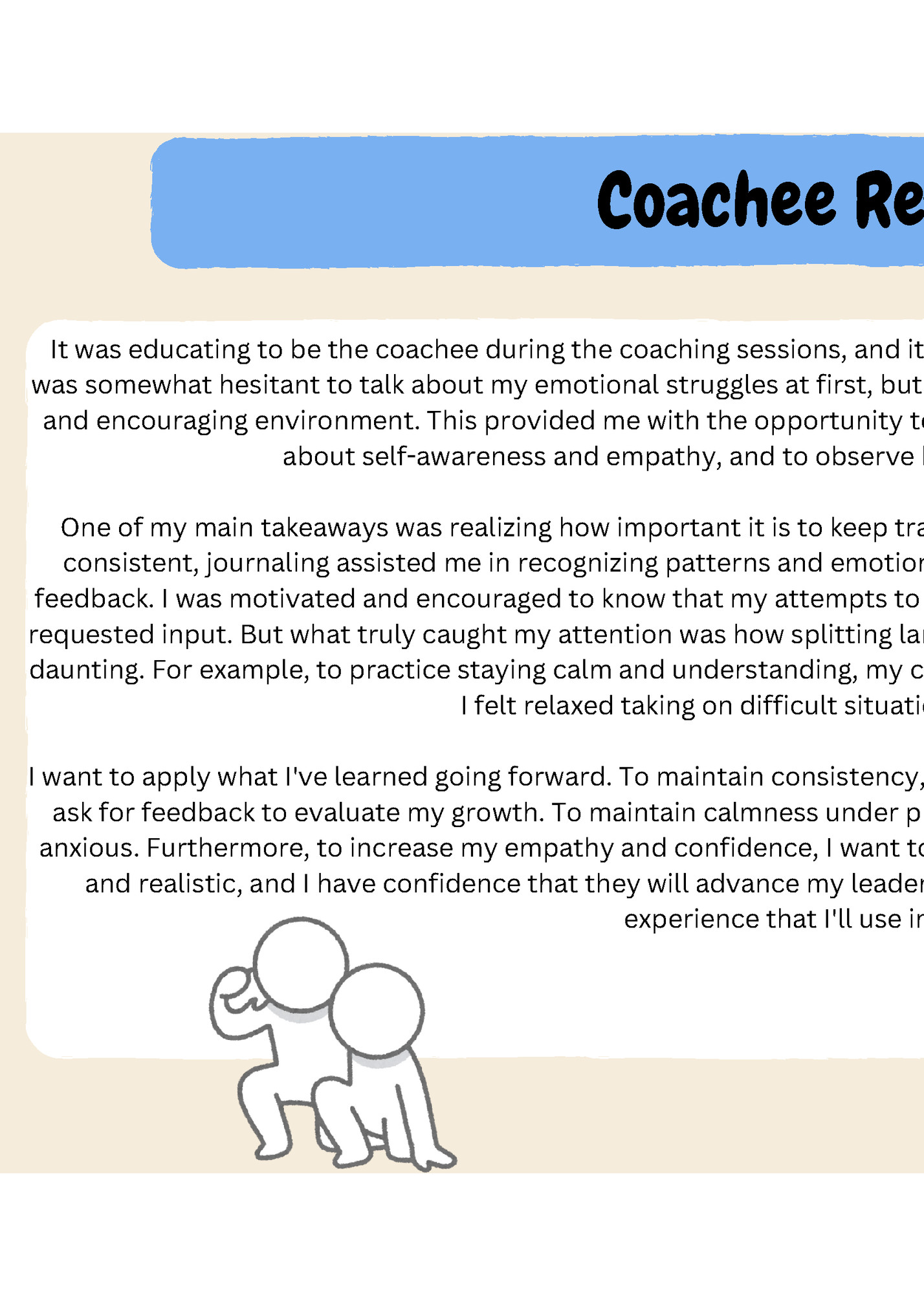
Challenge 1: Leading My Compensation Group Project Description of the Situation and Role: In my compensation group project, I was assigned as the leader, responsible for ensuring the team worked collaboratively and completed the deliverables on time. Early in the project, two group members disagreed over how to structure the presentation, which caused tension and delayed progress. My role as the leader was to resolve the conflict and get the team back on track. Key Actions Taken and Obstacles Faced: To address the conflict, I scheduled one-on-one discussions with each team member to understand their perspectives and concerns. After identifying the key points of disagreement, I facilitated a group meeting where everyone could share their ideas openly. Using active listening, I proposed a solution that incorporated elements of both suggestions, which the group agreed on. The biggest challenge I faced was managing frustration among team members and encouraging them to work collaboratively again. Reflection on Leadership Approach and Lessons Learned: This experience highlighted the importance of conflict resolution and collaboration in leadership. By staying calm and focusing on understanding everyone’s input, I was able to create a compromise that satisfied the group and kept the project moving forward. I learned that building trust and fostering open communication are essential for effective teamwork.
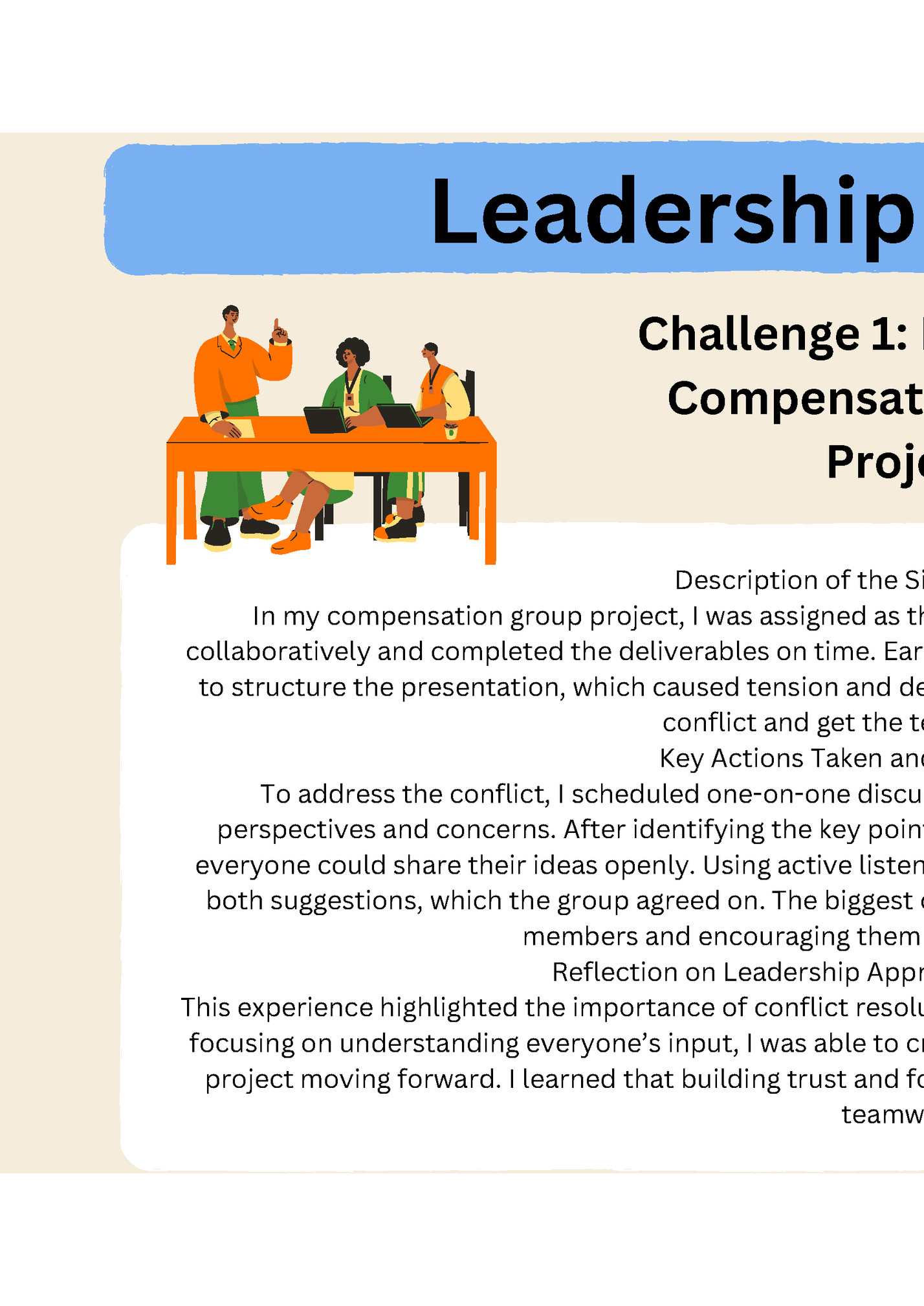
Challenge 2: Leading the Returns Section at a Warehouse Description of the Situation and Role: While working at a warehouse, I was promoted to team leader for the returns section. My primary responsibilities were training new employees, assisting with returns, and resolving any issues that arose during shifts. One challenge I faced was onboarding multiple new hires during a peak season, which required me to balance training with maintaining workflow efficiency. Key Actions Taken and Obstacles Faced: To manage the situation, I developed a structured training plan that included shadowing sessions, hands-on practice, and regular check-ins to address questions. When issues arose with complex returns or operational errors, I stepped in to resolve them quickly to avoid disruptions. A key obstacle was ensuring that the new hires felt supported while also meeting the department’s productivity targets. Reflection on Leadership Approach and Lessons Learned: This role taught me the importance of organization, patience, and clear communication. By creating a supportive environment and being approachable, I was able to help new employees build confidence and competence. I learned that effective leadership involves balancing team development with operational efficiency and that adaptability is crucial when managing high-pressure situations.
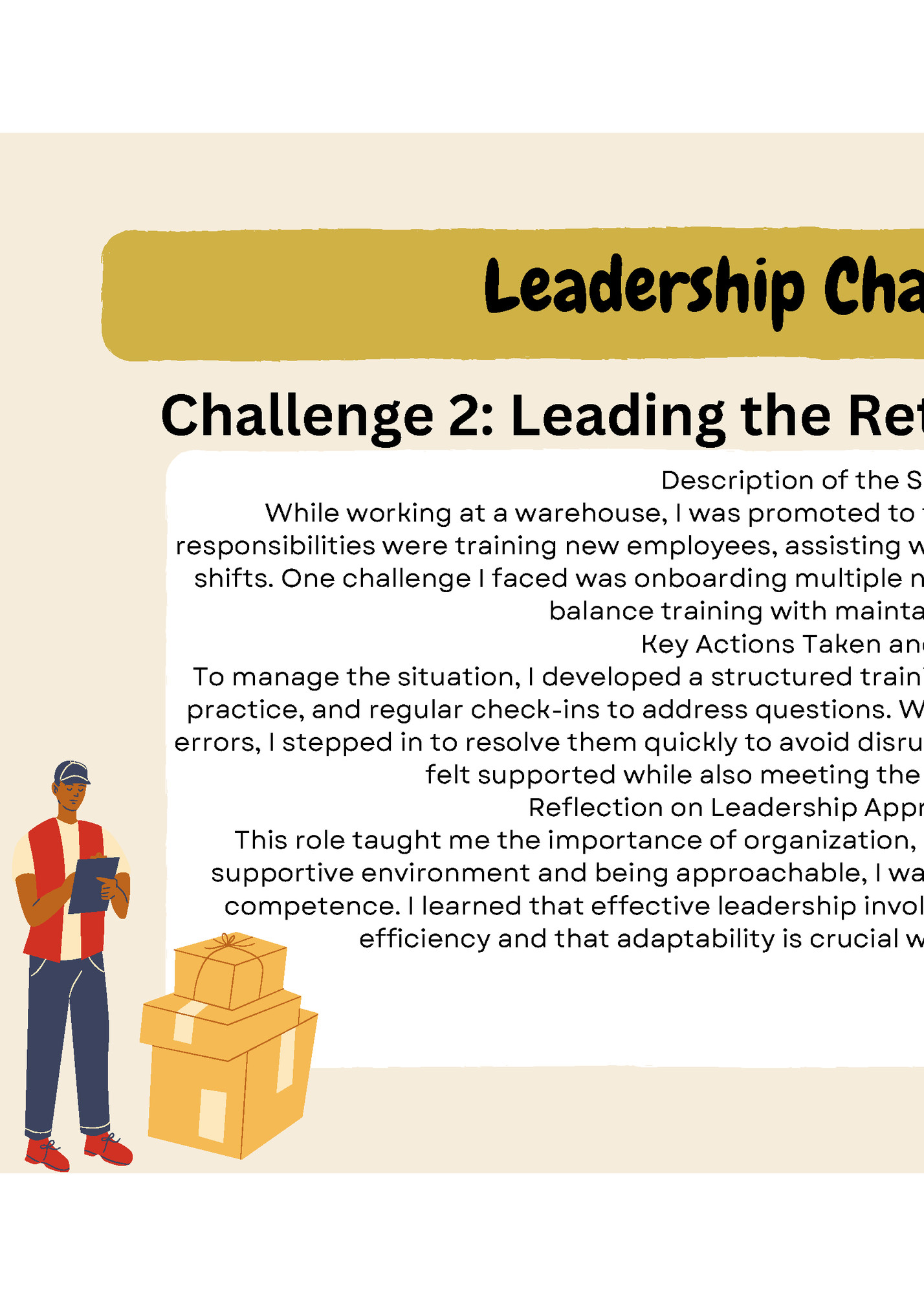
The Leadership Development Plan outlines a structured approach to focus on four priority areas that emerged through self-assessment and reflection. These areas—Personal Balanced Scorecard, Emotional Intelligence, Coachee Reflection, and Leadership Challenges—represent key aspects of my leadership development. By setting clear goals and actionable steps within specific timelines, I can enhance my leadership skills and ensure measurable progress in each area.
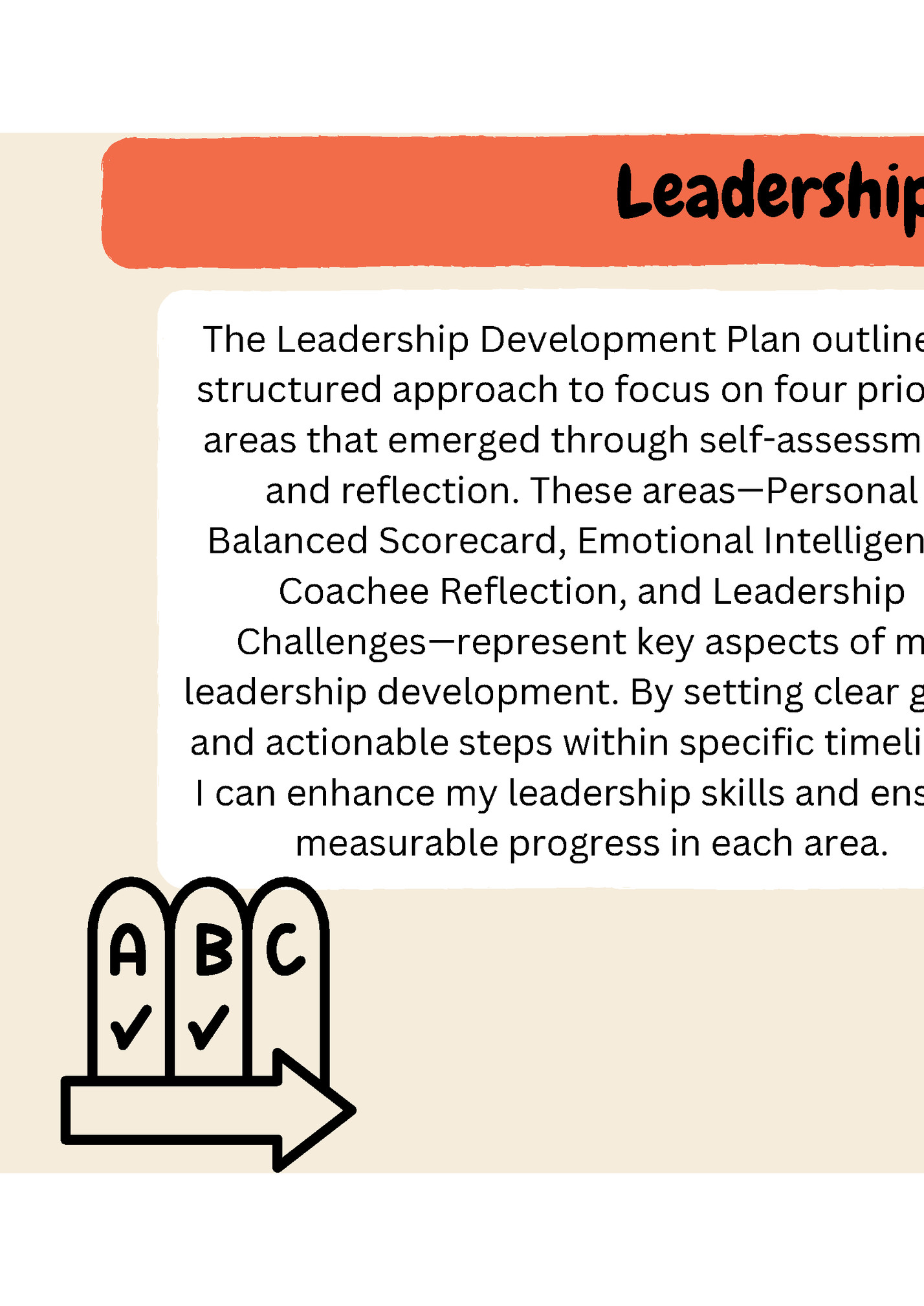
Fleepit Digital © 2021